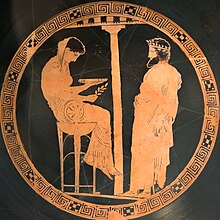
Back الديانة الإغريقية Arabic Qədim Yunanıstanda din Azerbaijani Религия в Древна Гърция Bulgarian Agama di Yunani Kuno BJN Relijion Henc'hres Breton Religió de l'antiga Grècia Catalan Řecké náboženství Czech Авалхи Грецин тĕнĕ CV Religion des antiken Griechenland German Αρχαία ελληνική θρησκεία Greek

| Part of a series on |
| Ancient Greek religion |
|---|
 |
Religious practices in ancient Greece encompassed a collection of beliefs, rituals, and mythology, in the form of both popular public religion and cult practices. The application of the modern concept of "religion" to ancient cultures has been questioned as anachronistic.[1] The ancient Greeks did not have a word for 'religion' in the modern sense. Likewise, no Greek writer known to us classifies either the gods or the cult practices into separate 'religions'.[2] Instead, for example, Herodotus speaks of the Hellenes as having "common shrines of the gods and sacrifices, and the same kinds of customs."[3]
Most ancient Greeks recognized the twelve major Olympian gods and goddesses—Zeus, Hera, Poseidon, Demeter, Athena, Ares, Aphrodite, Apollo, Artemis, Hephaestus, Hermes, and either Hestia or Dionysus—although philosophies such as Stoicism and some forms of Platonism used language that seems to assume a single transcendent deity. The worship of these deities, and several others, was found across the Greek world, though they often have different epithets that distinguished aspects of the deity, and often reflect the absorption of other local deities into the pan-Hellenic scheme.
The religious practices of the Greeks extended beyond mainland Greece, to the islands and coasts of Ionia in Asia Minor, to Magna Graecia (Sicily and southern Italy), and to scattered Greek colonies in the Western Mediterranean, such as Massalia (Marseille). Early Italian religions such as the Etruscan religion were influenced by Greek religion and subsequently influenced much of the ancient Roman religion.
- ^ Barbette Stanley Spaeth (2013). The Cambridge companion to ancient Mediterranean religions. New York. ISBN 978-0-521-11396-0. OCLC 826075990.
{{cite book}}: CS1 maint: location missing publisher (link) - ^ Esther Eidinow; Julia Kindt (2017). The Oxford handbook of ancient Greek religion. Oxford, United Kingdom. ISBN 978-0-19-881017-9. OCLC 987423652.
{{cite book}}: CS1 maint: location missing publisher (link) - ^ Warrior, Valerie M. (2009). Greek religion : a sourcebook. Newburyport, MA: Focus. ISBN 978-1-58510-031-6. OCLC 422753768.